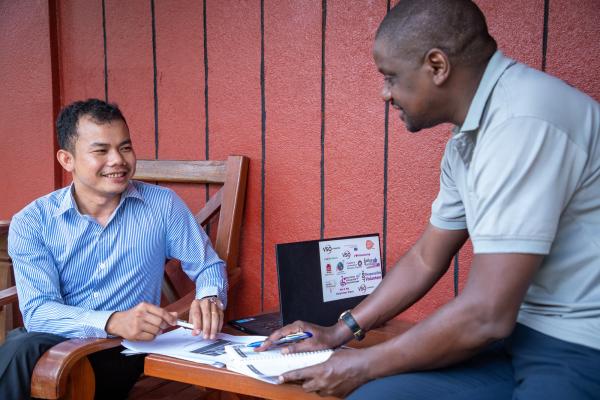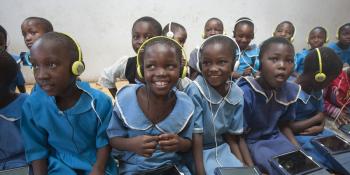This project was completed in 2021.
Supporting equal access to quality education through government capacity development.
Access to quality education in Cambodia has dramatically improved in recent years, thanks to ambitious teacher and school-based management reforms led by the Ministry of Education, Youth and Sport (MoEYS) and supported by development partners, including VSO.
Despite these improvements, however, some children – particularly those from marginalised and vulnerable groups – are still unable to benefit from the quality education they deserve. Barriers to learning can include special educational needs that teachers are unable to meet without support, harmful gender norms which place a lower value on girls’ education, and a lack of safe and healthy learning environments for some children.
As a result, repetition rates are high and in some regions, growing numbers of children are dropping out before completing primary school.
Strengthening quality education for all

Through the Capacity Development Partnership (CDP), the MoEYS, UNICEF and VSO are working together to enhance the government’s capacity to deliver high-quality, equitable education services across Cambodia. As part of our commitment to leave no child behind, our support is targeted and focuses on the most marginalised provinces, districts and schools.
VSO volunteers have provided coaching and mentoring to 384 key staff from provincial and district offices of education and school directors, supporting them to develop their skills in essential areas including planning, analysis, research, social accountability, and the use of participatory approaches.
Action research
Conducting action research is an essential stage of developing a strong evidence base for planning and developing policy. By evaluating their own actions, teachers and education leaders are able to identify what they are doing well, whilst reflecting on what needs to be improved.
Action research can also be a powerful tool for increasing a community's voice and participation in improving education provision at a local level.
To date, we have completed 14 pieces of action research, and have trained 63 Provincial Office of Education and 25 District Office of Education staff in the skills needed to undertake their own research and self-evaluations.
Action research guidebook
We have developed this guidebook for teachers, school directors and relevant government officials, to support them to undertake their own action research.
Social Exclusion and Gender Analysis (SEGA)
A SEGA analysis is a vital first step in delivering equitable education that works for everyone, by identifying who is excluded, and why.
By understanding the complexities of social exclusion and gender disparities within a specific context, key stakeholders become better informed and able to make evidence-based decisions. Conducting a SEGA also provides policymakers with the evidence they need to allocate resources where they are most needed.
SEGA guidebook
Our SEGA guidebook equips duty bearers with the tools and skills they need to gather and analyse in-depth information about gender disparity and social exclusion at a grassroots level. It also supports them to then use their findings to develop targeted plans and actions to ensure no-one is left behind.
Download the SEGA guidebook - English (PDF)
Download the SEGA guidebook - Khmer (PDF)
Capacity development
To ensure that education reforms are successful and impactful, it's essential that all stakeholders - from classroom teachers to government officials - have the necessary skills, knowledge and understanding to carry out their roles effectively. As well as the technical capacity needed to carry out specific tasks, key actors also need to develop 'soft' skills such as effective leadership, flexibility, and change management.
As part of the CDP, we collaborate closely with technical departments of the MoEYS and training providers such as the National Institute of Education, to provide a range of capacity development approaches centred on needs-based mentoring and coaching.
Through working together and providing on-the-job personalised support, individuals are able to learn and apply new concepts, reflect on current practice and behaviour, and establish sustainable approaches for improved ways of working.
Capacity development guidebook
This guidebook describes VSO's People First approach to coaching and mentoring, and explains how this model can be applied in the context of the CDP. It contains information for VSO coaches and mentors to support them in their capacity development work.
Download the Guidebook for capacity developers - English (PDF)
Download the Guidebook for capacity developers - Khmer (PDF)
Find out more about our work in:
Cambodia
We've worked in Cambodia since 1991, strengthening inclusive education systems and supporting people to develop secure and resilient livelihoods.

Education system strengthening
Developing inclusive education systems that leave no child behind.

Support us with a donation
